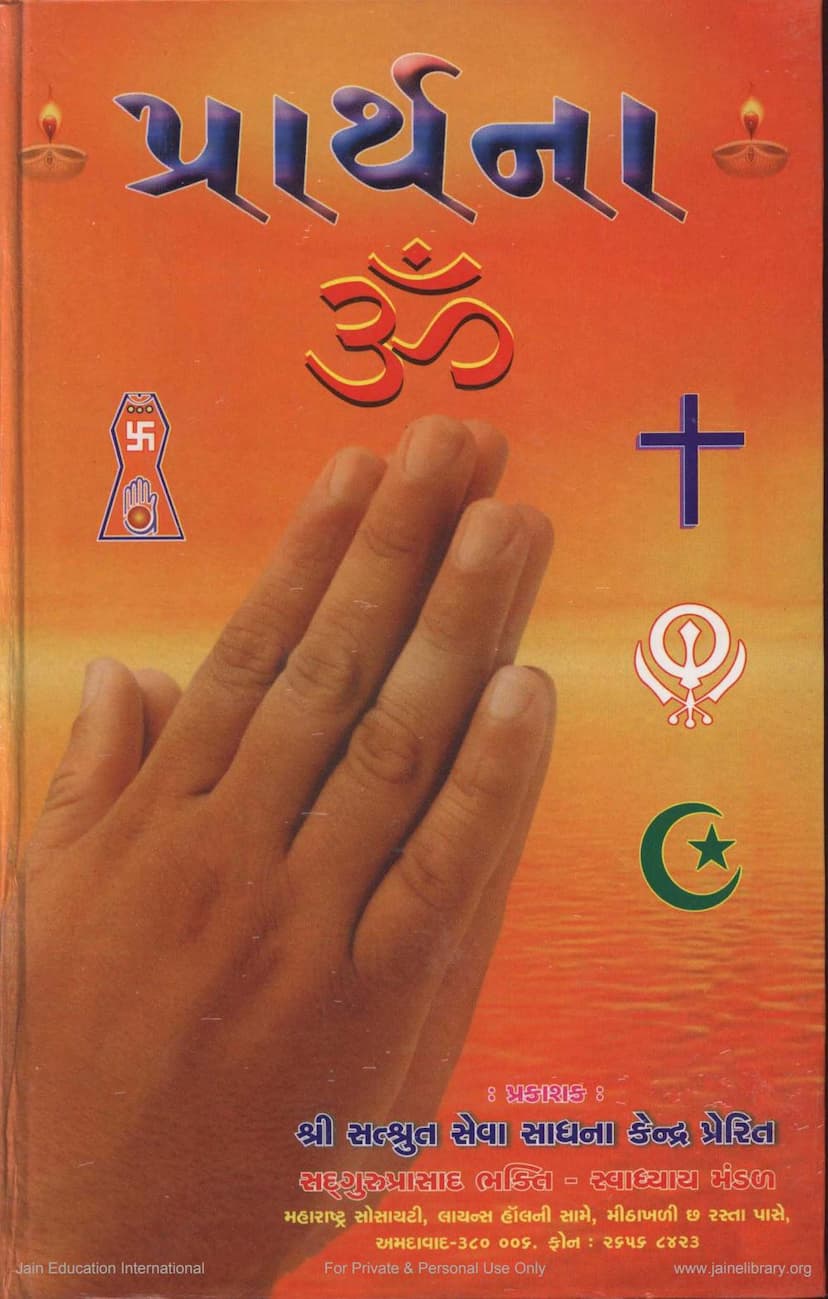Prarthana
Added to library: September 2, 2025

Summary
The book "Prarthana" (Prayer) by Param Shraddhey Sant Shri Atmanandji Maharaj is a comprehensive guide on the spiritual significance and practice of prayer within the Jain tradition. Published by Sadguru Bhakti Swadhyay Mandal, Ahmedabad, it aims to enlighten readers on how prayer can be a powerful tool for spiritual growth, purification, and ultimately, liberation (moksha).
Here's a summary of the key themes and content:
Core Message of the Book:
The central thesis of "Prarthana" is that prayer is not merely a ritualistic act but a profound spiritual discipline essential for all seekers, from the common person to the most advanced yogi. It emphasizes that true prayer is a manifestation of humility, faith, and surrender to the divine, leading to inner purity and spiritual progress.
Key Concepts and Chapters:
-
Introduction to Prayer (Samanya Bhumika):
- Prayer is presented as a vital component of spiritual practice, often seen as a subdivision of "humility" (laghuta) in the nine types of devotion.
- It serves as a crucial support system for the spiritual aspirant, helping to overcome despair and obstacles.
- The word "Prarthana" is derived from "Pra + Artha," meaning the pursuit of the highest meaning or purpose, which is identified as moksha.
-
The Science of Prayer (Prarthana nu Vigyan):
- Prayer is understood as the bridge between effort (purushartha) and destiny (prarabdha).
- It is highlighted as a powerful means of purifying the mind and strengthening faith.
- The book discusses the different types of devotees and their motivations for prayer:
- Artharthi (Desirer of Wealth): Seeks material gains, considered the lowest form of devotee but still acknowledged for having faith.
- Aart (Distressed): Prays for protection of existing possessions or relief from suffering.
- Jiggyasu (Seeker of Knowledge): Desires spiritual knowledge and ultimate truth, largely detached from worldly desires.
- Gyani (Knower): The highest form of devotee, whose prayer is unconditional and arises from complete self-realization.
-
Conditions for Prayer (Prarthana mate ni Sharto):
- Humility with Self-Surrender (Laghuta Sahit Atmasamarpan): True prayer requires recognizing one's limitations and surrendering to a higher power.
- Inner Faith (Antar no Vishwas): Unwavering belief in the divine is paramount. Doubt hinders the effectiveness of prayer.
- Confession of Faults without Attachment (Nihspruhta Purvak Nij Doshkathan): Honestly acknowledging one's faults and shortcomings without expecting worldly rewards is crucial.
- Vow to Not Repeat Mistakes (Karela Dosho Fari Na Karvani Pratigya): A firm commitment, often made in the presence of the Guru or the divine, to refrain from repeating past errors.
-
Prayer as a Scientific Process:
- Prayer is presented as a mechanism that synergizes human effort with divine grace.
- It's a form of atonement (prayshchitta), considered an inner penance that cleanses past sins and fosters virtuous qualities.
- The book asserts that prayer helps overcome insurmountable obstacles encountered on the spiritual path.
-
Faith (Vishwas):
- Faith is described as the foundation of all spiritual progress.
- It's not blind faith but a conviction born from understanding and, ideally, experience.
- The constant remembrance of the divine, stemming from faith, leads to meditation and ultimately, direct experience.
-
Confession of Personal Faults (Nihspruhata Purvak Nij Doshkathan):
- This involves acknowledging all known and unknown faults, understanding one's limited nature, and seeking divine assistance to overcome them.
- It highlights the importance of honesty and completeness in confessing one's failings.
-
Vow to Not Repeat Mistakes (Karela Dosho Fari Na Karvani Pratigya):
- This emphasizes the importance of a firm resolve and commitment, ideally made in the presence of a Guru or the divine, to correct past errors and prevent their recurrence.
- This vow, backed by sincerity and, if necessary, acceptance of penance, strengthens the spiritual resolve.
-
Conclusion (Upsanhar):
- The book concludes by reiterating the indispensable role of prayer in daily life for emotional stability, peace, and spiritual advancement.
- It emphasizes the need for sincerity, constant effort, and reliance on the teachings of enlightened masters.
- The practice of prayer, especially collective prayer, fosters discipline and mutual spiritual encouragement.
Author's Perspective:
Sant Shri Atmanandji Maharaj, a highly revered spiritual leader, draws from his deep understanding of Jain philosophy and his personal spiritual experiences. His own life, transitioning from a medical career to a spiritual path, underscores the transformative power of spiritual seeking and the importance of prayer. He advocates for a practical and sincere approach to prayer that integrates spiritual aspirations with daily life.
Overall Significance:
"Prarthana" serves as a practical and insightful manual for anyone seeking to deepen their spiritual practice. It demystifies prayer, presenting it as a science and an art that, when practiced with sincerity, humility, and unwavering faith, can lead to profound personal transformation and spiritual fulfillment. The book provides a framework for understanding the purpose, conditions, and benefits of prayer, encouraging readers to make it an integral part of their lives.